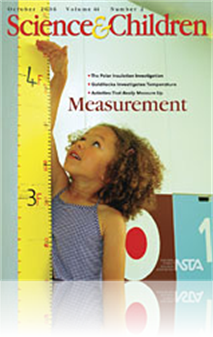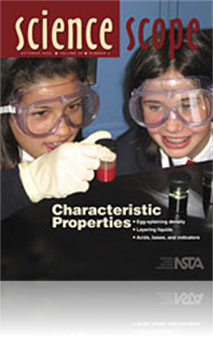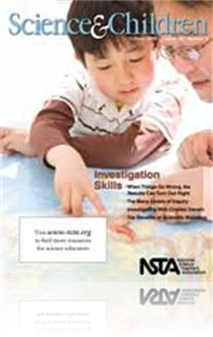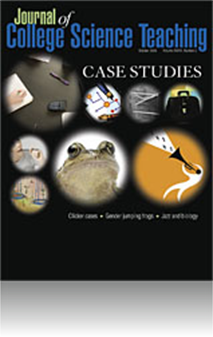All Resources
Journal Article
Measurement is an orphan that no one really wants. Mathematics and science standards both include measurement but few teachers really get excited by it. Despite the lack of excited in teaching measurement, some bizarre and extreme measurements do f...
Journal Article
Using a Course Management System to Improve Classroom Communication
Unfortunately, commercial Course Management Systems (CMS) are often expensive to purchase and maintain, removing them from the reach of many K-12 schools. An alternative is Moodle—Modular Object-Oriented Dynamic Learning Environment-- a free, ope...
Journal Article
The Polar Insulation Investigation
In this article an oceanographer discusses her development of an activity to help students explore polar-related questions more fully. "The Polar Insulation Investigation" builds on students' natural interest in "things polar" and introduces them to...
Journal Article
The Early Years: Learning Measurement
The world is filled with references to measurements that limit children's activities. It's no wonder children strive to be"big" when they often hear adults remarking, "That's too big a piece of cake for you," or "That's too far for you to walk". As...
Journal Article
Science Sampler: What is relative humidity relative to anyway?
When describing the amount of moisture present in the air, the term "relative humidity" is frequently not understood. In order to help students grasp the concept of relative humidity, it helps to ask the question, "Relative to what?" This simple demo...
Journal Article
Helping students to identify variable can be the key to other aspects of an investigation, such as the use of tables or graphs. In this article, we describe a tool we have successfully used to highlight the role of variables in an experiment: inquiry...
Journal Article
Editor’s Note: Investigation Skills
To borrow an idea from John Dewey, problem solving is both the method and purpose of education. Teaching investigation skills can help students move into understanding and applying content to solve real problems. Investigation skills must move from b...
Journal Article
Student preconceptions are one of the greatest challenges we face as science teachers. This Predict, Explain, Observe, and Explain (PEOE) activity challenges students’ preconceived notions about why matter floats or sinks when placed in a liquid. T...
Journal Article
Idea Bank: Joining the Search for Extraterrestrial Intelligence
Would you like to get your students involved in an authentic search for extraterrestrial intelligence? The SETI@home project is an ongoing science experiment harnessing the power of computers via the internet. The project is a great inspirational too...
Journal Article
Using free software called Google Earth, students can view Earth by hovering over features and locations they preselect or by serendipitously exploring locations that catch their fascination. This article presents a lesson in which students use Googl...
Journal Article
Analyzing toppling dominoes in slow motion sharpens students' observations of a fairly common childhood experience and stimulates creativity for subsequent explorations within the field of mechanics and forces in motion. With student participation as...
Journal Article
"Clicker" Cases: Introducing Case Study Teaching Into Large Classrooms
Case study teaching is difficult in large classes, especially in fixed-seat ampitheaters. The development of audience response systems, or "clickers," for use in classrooms has opened up exciting new possibilities for creating and implementing inter...
Journal Article
Science 101: Why is a light-year a unit of distance rather than a unit of time?
There are many issues associated with measurement that can be confusing. From light-years, to Richter scales, to logarithmics, Bill Robertson makes science more palpable for the average person. ...
Journal Article
After the Bell: Beachcombing for fossils
If you have ever taken a field trip to a natural history museum or an aquarium, you may have noticed in the gift shop a display of fossil shark teeth that can be as old as 65 million years for sale. Where did these teeth come from? How are the ages o...
Journal Article
This article explores the tensions embedded in the implementation of the No Child Left Behind Act of 2001 (NCLB) that pose both opportunities and challenges for biology instruction with implications for all the sciences. It highlights issues that may...








